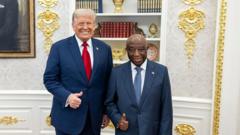Leaders around the globe appear to be learning how to navigate the complex dynamics of diplomacy during the Trump presidency, opting for a strategy of flattery to gain favor and potentially secure advantages for their nations, even if the outcomes remain uncertain.
Trump's Diplomatic Game: Flattery and Promises of Peace

Trump's Diplomatic Game: Flattery and Promises of Peace
Israeli Prime Minister Netanyahu's Nobel nomination for Trump highlights a trend in global diplomacy where leaders seek favor through praise.
As President Donald Trump dined in the White House Blue Room with Israeli Prime Minister Benjamin Netanyahu, a moment of choreographed diplomacy unfolded. Netanyahu presented Trump with a letter nominating him for the Nobel Peace Prize, exclaiming, “It’s well deserved, and you should get it.” Trump, acknowledging the gesture, stated it was “very meaningful,” despite his constant skepticism that he would ever win such an award.
This interaction is emblematic of how global leaders have adapted to Trump's unique style of diplomacy. Many now perceive that showering praise upon him is an effective way to influence outcomes, even if clear benefits for their own countries remain ambiguous. Canada’s Prime Minister Mark Carney, who previously criticized Trump’s tough persona, recently commended the president for his “personal leadership of the United States.” Similarly, NATO Secretary-General Mark Rutte sent a glowing message to Trump after his notable actions related to Iran, which Trump proudly shared with the public.
As international leaders engage in this flattering approach, the question lingers: Is this superficial praise translating into tangible diplomatic progress, or is it merely an exercise in appeasement with uncertain results?
This interaction is emblematic of how global leaders have adapted to Trump's unique style of diplomacy. Many now perceive that showering praise upon him is an effective way to influence outcomes, even if clear benefits for their own countries remain ambiguous. Canada’s Prime Minister Mark Carney, who previously criticized Trump’s tough persona, recently commended the president for his “personal leadership of the United States.” Similarly, NATO Secretary-General Mark Rutte sent a glowing message to Trump after his notable actions related to Iran, which Trump proudly shared with the public.
As international leaders engage in this flattering approach, the question lingers: Is this superficial praise translating into tangible diplomatic progress, or is it merely an exercise in appeasement with uncertain results?






















